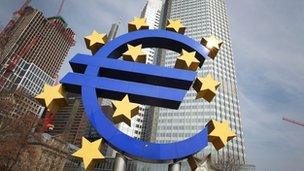The eurozone is growing again, but don't pop any corks yet
- Published

The eurozone had been in recession since the end of 2011
It's not much, and it is unevenly distributed, but it is growth. Germany, as expected, has led the eurozone out of recession. France also managed moderate growth.
Some of the economies at the centre of the crisis continued to contract, but more slowly than before. That was true of Greece, Italy and Spain.
Even that, in the context of the eurozone crisis must be considered good news.
Most surprising was Portugal's return to growth after more than two years of declining economic activity.
But it's hard to disagree (for once, some might say) with the European Commissioner for Economic Affairs, Olli Rehn.
Welcoming the figures, he added a note of caution: "self-congratulatory statements suggesting the crisis is over are not for today," he said.
He's dead right. Nobody is forecasting a really robust recovery in the near future. It will take more rapid growth than we have seen in these new figures to make much of an impact on the eurozone's two big problems, unemployment and stressed government finances.
Progress
There certainly have been some signs of progress in these areas.
The eurozone unemployment rate hasn't increased since March - and yes, that is progress. I have lost count of the number times I have had to deal with eurozone unemployment hitting a new record.
The jobless rate in Spain has edged down in the most recent figures. But it remains excruciatingly high; over 25% in Spain and Greece, and in double figures for all the crisis countries plus France.
Governments have also made progress in reducing their borrowing needs. But it has been by the painful method of cutting spending and raising taxes.
What they could really do with is a bit of the pain-free deficit reduction that comes with strong growth generating more tax revenue.
That is not on the immediate horizon. The focus is on economic reforms intended to encourage growth, more flexibility in the labour market and promoting competition, for example.
But such measures are contentious, politically difficult and in any case take time to implement and yield results.
Big bazooka
So there is a long way to go for the eurozone. But as long as there isn't another downturn, the end of the recession is an important milestone.
It marks another stage on the rather slow process of rehab that really began a little over a year ago when the President of the European Central Bank, Mario Draghi, made his "whatever it takes" speech.
The key remark was: "Within our mandate, the ECB is ready to do whatever it takes to preserve the euro. And believe me, it will be enough."
Later, he spelled that out, saying the ECB would buy the bonds or debts of struggling governments in some specific circumstances. In fact the ECB has not bought a single bond or spent a single euro under the proposal he set out.
Nonetheless, the mere fact that the ECB was ready to act - that it had revealed what commentators called a "big bazooka" - did restore a degree of calm to financial markets. That, in turn, has underpinned the stabilisation that appears to be slowly taking place in the wider economy.
So now for some really robust economic growth in the eurozone! Well, not just yet, perhaps.
- Published14 August 2013